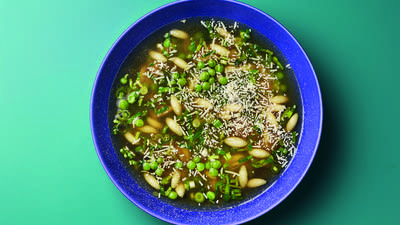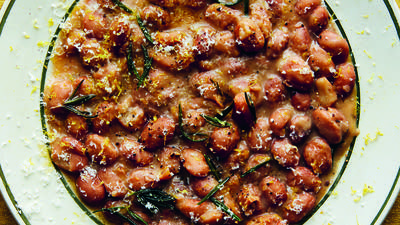
You know that black-and-white cow we see in TV ads and farm pastures? That is the Holstein. She is America's prime cow when it comes to producing lots of milk. But a French veterinarian with an interest in dairy genetics thinks our Holstein needs a leg up.
Jérôme Chateau is president of Normande Genetics, a company that offers dairy farmers Normandy's very own French cow for breeding. With its "sunglasses" (the dark circles around its eyes) and brown-and-white speckles on its coat, the Normande breed is known for being adapted to a grass-based grazing system and for its rich milk. If there is a Normande cow in the pasture, good cheese could be up the road.
Lynne Rossetto Kasper: Why don't you like our Holsteins?
Jérôme Chateau: I do like your Holsteins, but I also like the farmland and your farmers. I think over the past several decades things have changed and the dairy economy has reached another stage. Right now there are really two tracks in a very intensive mode of production. The needs are different for each segment, and the Holstein is not necessarily the best-adapted to either.
The selection of the Holstein has been really, really intense over the past 50 years thanks to artificial insemination among other things. That very nice cow has been made into a very tall, skinny, narrow and fairly weak animal with very high production. It is very well-adapted to a high-grain diet and intensive operations, but it has lots of problems, even in those operations that are less intensive as well. That's the problem.
LRK: They have been developed to give us a maximum amount of milk. But what are you saying, that they have problems with their health or the quality of the milk?
JC: Especially with their health, utility and longevity. Today a Holstein barely makes it to 4 years on average -- barely two calves, not even two lactations. The turnover is very high and it has very little longevity. With lots of metabolic diseases and a very weak fragility, it's very hard to get those Holsteins bred back. The production has reached a stratospheric level -- the Holstein has very few components so its milk is not particularly rich. All those elements make the breed fairly unsustainable.
LRK: You have Normande cows and you offer those cows for breeding in the U.S. What are the qualities of the Normande cow?
JC: The Normande, unlike the Holstein, has not been selected as intensely on milk production only, on quantity only. It has been selected for a variety of traits that include muscularity, body condition, and the components and the quality of the milk. For those reasons -- and because it has retained its original qualities and is a more balanced type of cow that doesn't look as skinny as the Holstein -- it is more adapted to grass-based systems.
LRK: This is really a cow for grazing. Holsteins don't graze anymore?
JC: Holsteins have not grazed for about 50 or 60 years. That's a particularity of the American system: Dairy cows have basically been kept out of the pasture since the '50s. Holsteins have been selected since then on no-grazing operations. Of course you can try to put them back in grazing, but you run into some issues because grass typically is not as consistent as a diet.
LRK: The Normande cow in France is famous for its rich milk. That milk goes into some very famous cheeses and crème fraîche. Is this cow being bred in the U.S. to increase those qualities in the milk?
JC: It's definitely one of the reasons people are interested in this breed. A number of dairy farmers are paid for components -- not everyone is paid for the richness of the milk, but a number are. In this case they are definitely interested in increasing the richness of the milk. For those who make cheese, of course it's even more of a reason to have a Normande cow.
Ed. note: Chateau listed these cheese makers and high-end dairy producers using Normande cows:
Balfour Farm, Maine (dairy)
Canal Junction Farmstead, Ohio (meat and dairy)
Cedar Summit Farm, Minn. (dairy)
Cellars at Jasper Hill, Vt. (cheese)
Chase Hill Farm, Mass. (cheese)
Estrella Family Creamery, Wash. (cheese)
Jacobs & Brichford, Ind. (cheese)
Meadow Creek Dairy, Va. (cheese)
Pleasant Ridge Reserve, Wis. (cheese)
Robie Farm, N.H. (dairy)
Robinson Farm, Mass. (cheese)
Samish Bay Cheese, Wash. (cheese)
Sidehill Farm, Mass. (yogurt)
Before you go...
Each week, The Splendid Table brings you stories that expand your world view, inspire you to try something new, and show how food connects us all. We rely on your generous support. For as little as $5 a month, you can have a lasting impact on The Splendid Table. And, when you donate, you’ll join a community of like-minded individuals who love good food, good conversation, and kitchen companionship. Show your love for The Splendid Table with a gift today.
Thank you for your support.
Donate today for as little as $5.00 a month. Your gift only takes a few minutes and has a lasting impact on The Splendid Table and you'll be welcomed into The Splendid Table Co-op.




